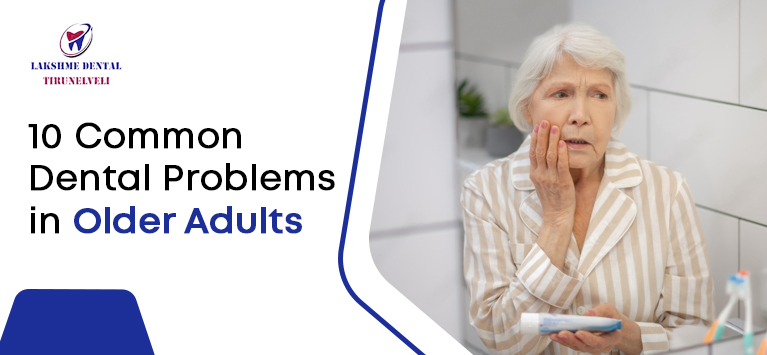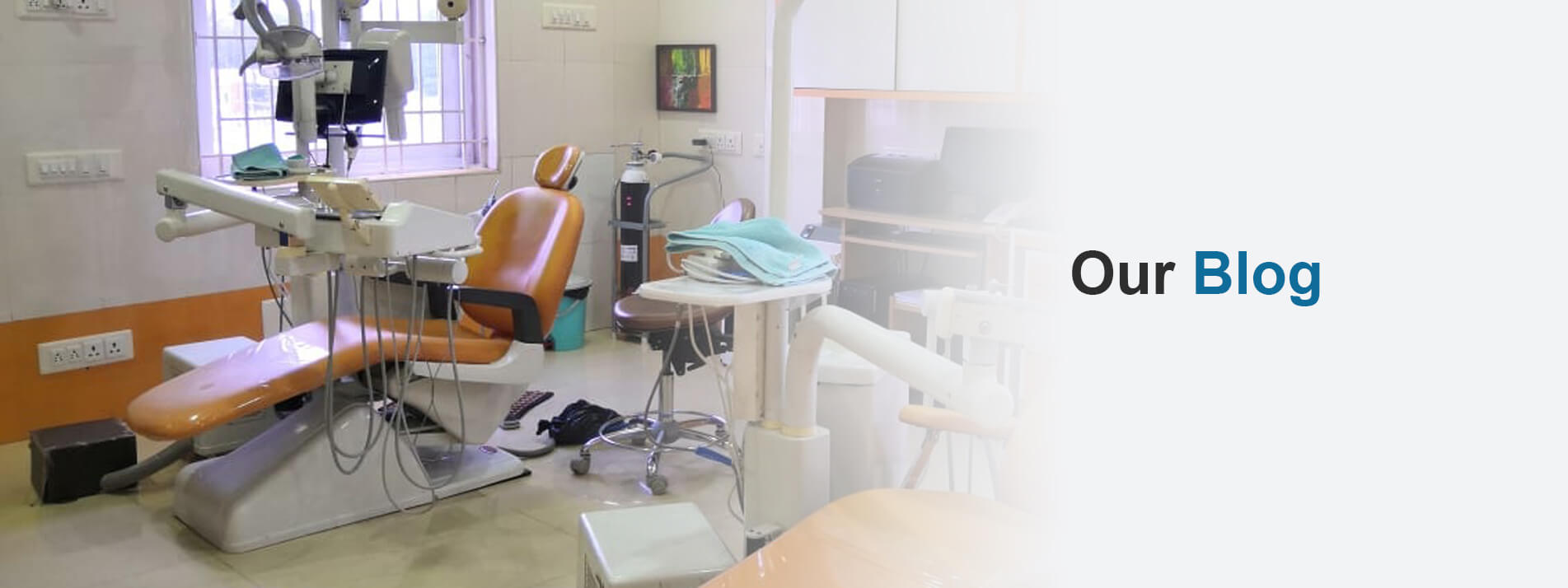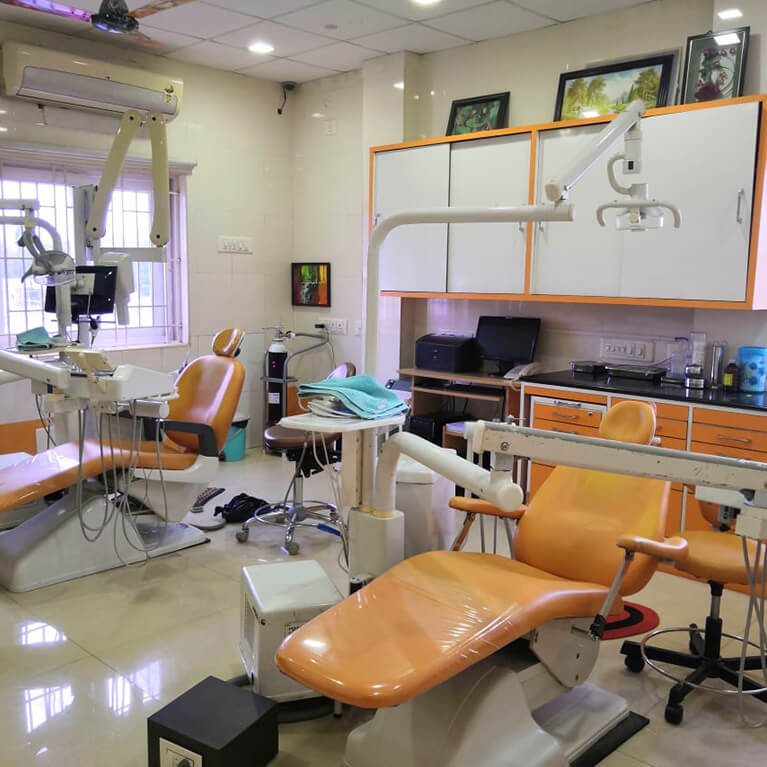
10 Common Dental Problems in Older Adults
We all know that ageing will cause changes in all cells, tissues, and organs. These changes affect every body part, including the teeth and gums. The ageing process frequently carries with it some common dental issues. This is why you should navigate the path with care while becoming older.
This blog concerns ten dental problems in older adults that arise as we age. And we’ll have a peek at practical solutions to them. Stay till the end. And you’ll have a toolkit of tips. It will ensure that your smile will be a source of joy.
Exploring 10 Common Dental Challenges in Aging
It’s general to notice these 10 dental problems in older adults as the years gracefully pass by. We will take a look at these common issues in more detail. Some of them are:
1. Tooth Sensitivity
Have you ever felt a twinge of discomfort when sipping on your favourite hot or cold beverage? As the years roll on, your teeth may become more sensitive. The culprits often include receding gums or worn enamel. To overcome this, buy toothpaste developed specifically for sensitive teeth. These kinds of toothpaste have desensitising ingredients, which aid in relieving sensitivity. Likewise, use a soft-bristled toothbrush for a gentler touch while still practising good oral hygiene.
2. Cavities
Even if you’ve mastered the art of brushing, cavities can still sneak in. A dry mouth, common among seniors, reduces saliva—a natural defender against cavities. Combat this by staying hydrated and chewing sugar-free gum to boost saliva production. Regular dental check-ups become even more critical. It will assist you in avoiding dental problems, such as cavities, in older adults.
3. Gum Disease
Gum disease can be sneaky, creeping up without much warning. Bleeding gums, bad breath, or changes in how your dentures fit can be red flags. Regular dental check-ups and a thorough at-home care routine are your allies against gum disease. Flossing is one of them. It’s not about a battle. Furthermore, it’s about a daily defense routine to keep your gums healthy.
4. Missing Teeth
Missing teeth can lower your confidence and chewing abilities. The good news is that dental bridges and dentures can fix these spaces and bring back your smile. Dental bridges are permanent prosthetics that fill the gap left by lost teeth. At the same time, dentures are removable replacements. Both alternatives offer practical and visual advantages. This will help you regain the courage to show off your entire smile.
5. Oral Cancer
The risk of catching mouth cancer rises with age. Regular dental check-ups are essential because dentists can detect any problems early. Keep a close check on your mouth for any changes. They involve continuous lumps or sores. It is not about being afraid; it is about being informed and taking control of your dental health. Early detection dramatically improves effective treatment odds, showing the value of routine check-ups.
6. Dry Mouth
Dry mouth, a common sidekick to ageing, can lead to various dental problems. Sip water all day to keep your mouth hydrated. Chewing sugar-free gum can also aid in saliva stimulation. A well-hydrated mouth is a happy mouth. Moreover, consider using over-the-counter saliva substitutes. Or speak to your dentist about prescription medications. It can alleviate dry mouth symptoms.
7. Denture
For those with dentures, proper care is non-negotiable. Clean them daily and soak them overnight. In addition to this, give your gums a break by taking the dentures out at night. Regular check-ups with your dentist ensure your dentures fit snugly and comfortably. Ill-fitting dentures can cause discomfort, trouble speaking, and even dietary difficulties. A clean set of dentures improves your oral health. Of course, it also benefits your entire well-being.
8. Tooth Discoloration
Tooth discoloration is a common woe that can accompany aging. Regular cleanings by your dentist can help remove surface stains. Consider reducing the consumption of staining substances like coffee and red wine. If discoloration persists, ask your dentist about professional whitening options for a more youthful smile.
9. Enamel Erosion
Enamel erosion, a gradual process, exposes your teeth to increased sensitivity and vulnerability. Limit your intake of acidic meals and beverages. Rinse your mouth with water after eating acidic meals. Wait at least 30 minutes before brushing to avoid injuring weakened enamel. Regular dental check-ups can catch enamel erosion early on, preventing further damage.
10. Jaw Joint Issues
As we age, jaw joint issues may arise, causing discomfort or clicking sounds. Avoid excessive chewing of hard foods and consider gentle jaw exercises. It will help you go a long way in keeping your jaw comfortable and pain-free. If you are feeling continuous jaw pain, consult your dentist for guidance.
Other Common Dental issues in Old Age
Other common dental problems in old age include gum problems, mouth ulcers, and root caries.
Teeth Mobility:
In old age, teeth mobility can become more prevalent due to factors like gum recession and decreased immune response. These issues can lead to discomfort, sensitivity, and an increased risk of teeth mobility, such as periodontitis and a receding gum line. Always remember that regular dental check-ups and proper oral hygiene are crucial for maintaining oral health as we age.
Mouth Ulcers:
Mouth ulcers, a common issue in older adults, can be caused by various factors such as stress, nutritional deficiencies, or oral health conditions. These ulcers can cause discomfort, making it difficult to eat and speak comfortably. Proper oral hygiene, a balanced diet, and stress management techniques can help in managing and preventing mouth ulcers.
Root Caries:
Root caries, a prevalent issue among the elderly, occurs when the root surfaces of teeth are affected by decay. Factors such as gum recession and exposed root surfaces due to aging can increase susceptibility to this condition. Prevention involves maintaining good oral hygiene, including regular brushing and flossing, as well as professional dental care to address any early signs of decay.
Winding Up
Growing older doesn’t mean saying goodbye to a healthy smile. Embrace these simple tips to tackle common dental problems in older adults gracefully. Do regular dental check-ups, have a consistent at-home care routine. If you follow these tips, you will always smile brightly and gracefully as you age.










